Take a Look at Africa’s Longest Serving Presidents
The African continent has had a number of leaders who have spent decades in office despite claims to democracy.
These leaders have been in power for extended periods due to a combination of factors, including constitutional changes, electoral fraud, and the suppression of political opposition.
Despite the length of their tenure, some of these leaders have been criticized for human rights abuses, corruption, and poor governance.
Below is a list of top African current heads of state including royalty, arranged in order of length of time they have held such positions continuously.
Teodoro Obiang (44 years)
The longest serving president in Africa as of today, he is the current and second president of Equatorial Guinea, a position he has held since August 1979. He is the longest-serving president not just in Africa but of any country ever.
Obiang Teodoro came into power after he ousted his uncle, Francisco Macías Nguema, in an August 1979 military coup.

Paul Biya (41 years)
Paul Biya has served as the president of Cameroon since 6 November 1982. He is the second-longest-ruling president in Africa and one of the oldest presidents in the world.
His regime is supported by France, one of the former colonial powers in Cameroon, which supplies it with weapons, aids and trains its military forces.

Denis Sassou Nguese (39 years)
The Republic of the Congo’s President Denis Sassou Nguess has spent 34 years in office, but not in one go. He first served from 1979 to 1992 and returned in 1997 at the end of a civil war. He is the third longest serving president in Africa.

Yoweri Museveni (37 years)
Yoweri Museveni has been the president of Uganda since 1986 making him the fourth longest serving African president. He took office in January 1986 after winning the war that toppled Ugandan presidents Milton Obote and Idi Amin.
Records indicate that none of the Ugandan elections have been found to be free and transparent since Museveni took over.
King Mswati III (37 years)
Mswati III is the king of Eswatini (formerly Swaziland) and head of the Swazi royal family.
He was crowned as Mswati III, Ingwenyama and King of Swaziland, on 25 April 1986 at the age of 18, making him the world’s youngest king at the time.
He co-rules the nation with his mother, Ntfombi Tfwala, who is currently Queen Mother (Ndlovukati).

Isaias Afwerki (30 years)
Isaias Afwerki is the first president of Eritrea. The Eritrean leader Isaias Afwerki has been in charge since the country got its independence from Ethiopia in April 1993.
He is the sixth longest serving president in Africa.
Letsie III (27 years)
Letsie III is the current King of Lesotho and the 7th longest serving ruler in Africa. He succeeded his father, Moshoeshoe II, after he died in a car crash in 1996. His coronation took place in October 1997 at Setsoto Stadium and was attended by current King Charles of England. As a constitutional monarch, most of King Letsie’s duties as monarch of Lesotho are ceremonial.

Ismaïl Omar Guelleh (24 years)
Ismaïl Omar Guelleh is the current President of Djibouti. He has been in office since 1999, making him the 8th longest-serving ruler in Africa.
Guelleh was first elected as President in 1999 as the handpicked successor to his uncle, Hassan Gouled Aptidon, who had ruled Djibouti since independence in 1977. He was re-elected in 2005, 2011 and again in 2016.

Mohammed VI (24 years)
Mohammed VI is the King of Morocco. He belongs to the ‘Alawi dynasty and ascended to the throne on 23 July 1999, upon the death of his father, King Hassan II.
Mohammed is the 9th longest serving ruler in Africa and is also regarded by the Royal Islamic Strategic Studies Centre as the seventh most influential Muslim in the world in 2022.

Paul Kagame (23 years)
Paul Kagame who assumed office in 2000 is the fourth and current president of Rwanda, and the 10th longest serving president in Africa. Kagame had been de facto leader since 1994, but focused more on military, foreign affairs and the country’s security than day-to-day governance. He only went after the top job when the then president Bizimungu resigned. Kagame was sworn in as president in April 2000.









